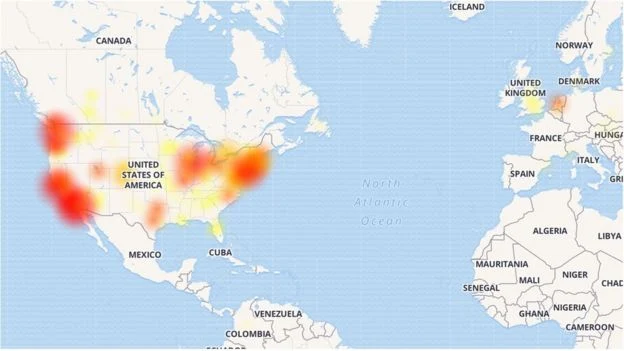Zimbabwe's long-time President Robert Mugabe has been holding direct talks with the army over his future.
Pictures emerged of the 93-year-old meeting the army chief and two envoys from South Africa at his official residence in Harare.The army put Mr Mugabe under house arrest on Wednesday after moving in to take control.
Opposition leader Morgan Tsvangirai says Mr Mugabe must resign but sources suggest the president is resistant.
Why did the military take this action?
President Mugabe has been in control of Zimbabwe since it threw off white minority rule in 1980.However, the power struggle over who might succeed him, between his wife Grace Mugabe and former Vice-President Emmerson Mnangagwa, has split the ruling Zanu-PF party in recent months.
Last week, Mr Mugabe came down in favour of his wife, sacking Mr Mnangagwa, a veteran of Zimbabwe's anti-colonial struggle.
That proved too much for military leaders, who seized control of the country on Wednesday.
The story in full
- The view from Zimbabwe: Any change will do
- The basics: Five things you should know about Zimbabwe
- The Mugabes and other key players in profile
So what's going on in Harare now?
It's very unclear.Photos in the Zimbabwe Herald showed Mr Mugabe meeting army chief Gen Constantino Chiwenga and the two South African envoys from the Southern African Development Community (Sadc) at State House in Harare.
Alongside them was Father Fidelis Mukonori, a Roman Catholic priest known to Mr Mugabe for years who has been brought in to mediate.
Sources close to the talks say Mr Mugabe is refusing to stand down voluntarily before next year's planned elections.
"He is refusing to step down. I think he is trying to buy time," one source close to the army leadership told the AFP news agency.
Zanu-PF officials had earlier suggested Mr Mugabe could remain nominally in power until the party congress in December, when Mr Mnangagwa would be formally installed as party and national leader.
What do South Africa and the region want?
South Africa is hosting millions of Zimbabweans who fled after the country's economy crashed in 2008. It has a special interest in seeing stability restored.South African Defence Minister Nosiviwe Maphisa-Nqakula and State Security Minister Bongani Bongo are the envoys meeting Mr Mugabe on behalf of Sadc, which South Africa currently leads.
They will be pushing for a democratic solution. The body, which represents 16 countries, does not support coup-led governments as this would set a dangerous precedent in the largely peaceful region, says the BBC's Pumza Fihlani in Johannesburg.
The head of the African Union (AU), Guinean President Alpha Condé, was clear the AU would "in no case accept" a military seizure of power. He said he was "inviting the army to return to its barracks and return to constitutional order".
And Zimbabwe's opposition?
Mr Tsvangirai, head of the Movement for Democratic Change-Tsvangirai (MDC-T) party and the main opposition leader in Zimbabwe, said on Thursday: "In the interests of the people, Mr Robert Mugabe must resign... immediately."Mr Tsvangirai, who has been abroad receiving treatment for cancer, also called for a "negotiated all-inclusive transitional mechanism" that would lead to "comprehensive reforms for free and fair elections to be held".
This has been echoed by another Zimbabwean opposition leader, Tendai Biti, who told the BBC: "It is urgent that we go back to democracy... that we go back to legitimacy but we need a transitional period and I think, I hope, that dialogue can now be opened between the army and Zimbabweans."
You might also want to read:
What's happened to Grace Mugabe?
Early reports suggested Mrs Mugabe had fled to Namibia, but sources now say she is in the family compound along with senior figures from the "Generation-40" group that backs her - cabinet ministers Jonathan Moyo and Saviour Kasukuwere.On Wednesday, one of her key allies, Zanu-PF youth wing leader Kudzai Chipanga, made a televised apology for criticising the head of the army as a war of words raged prior to the military takeover.
Mr Chipanga is thought to be in army custody but insisted his statement was voluntary.
Local media reports say a number of other senior members of the "Generation-40" group have also been detained.
What are Zimbabweans being told?
Zimbabwe's media usually toe the government line and today's lead stories make it clear there is a new line to follow.There is a striking absence of tough questions about what the army is doing.
"Business as usual countrywide," says The Herald, a government-owned newspaper. Yesterday it reassured readers there was "no military takeover".
State TV and radio stations have returned to regular programming, with Thursday's lunchtime news bulletin on state TV giving little indication of the political upheaval.
Some privately owned newspapers have dared to address the possible end of Robert Mugabe's rule.
"Transitional govt planned … as Mugabe cornered," the Financial Gazette reports. "Zimbabwe scents the end of an era," it added.
"It could easily have been entitled The end of an error. A 37-year-old error," says a similarly headlined commentary in NewsDay.
Was this a popular uprising?
Not so far, no. There have been no reports of unrest in Zimbabwe, and so far this appears to be a struggle within Zanu-PF.Correspondents say many people have accepted that President Mugabe is being eased from office. Streets in Harare are said to be quieter than usual but people are going about their business.
On Wednesday, troops and armoured vehicles encircled parliament and other key buildings.
Hours earlier, soldiers took over the headquarters of national broadcaster ZBC and issued a statement saying that the military was targeting "criminals" around President Mugabe.














